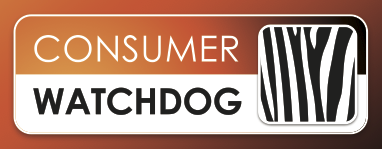I even love my wife’s iPhone, despite it being a catastrophically flawed device that Orange can’t seem to get to work properly.
However, just because I love all this stuff that doesn’t mean I’m an unquestioning supporter of technology in every circumstance. In fact I’ve even done presentations to IT people with a starting slide that says, in big, bold characters “Technology is not the answer”. It’s not just a provocative statement, I truly believe it.
Technology itself it never the answer to a business or personal problem. Of course it can help but the technology itself is rarely the answer.
Example no. 1. Some banks have, in the past, installed silly little consumer response devices at teller stations that allow you to record how satisfied you were with the service you received. A complete waste of time. How can you summarise a service experience with the press of a button. You can’t summarise all your feelings about the temperature, the speed of service, the smile on the teller’s face, the interest rate you are paying by answering the question “Are you satisfied? Yes / No / Don’t give a damn”. It isn’t that simple. Life and service are much more complicated than that. Those devices are a complete waste of time and are simply a distraction from the real business of service. They’re also a way for the customer service people to say they’re doing their job when in fact they’re not.
Example no. 2. The big one. e-Government. Our esteemed Government have embarked on an “e-Government project”. Put simply this is a way of allowing consumers, citizens, businesses, whoever, to connect to Government electronically. Maybe eventually we’ll even be able to file our tax returns, apply for replacement driving licences, all sorts of things on-line. No more will we have to queue up in Government offices to do the basics.
Perhaps. I suspect not. While I love the idea of e-Government I much prefer the idea of Good-Government first. Just plastering a web site on top of an already failing process is a waste of everyone’s time. It’s just like wallpapering over a cracked wall. It doesn’t solve any problems, it just briefly hides the problems underneath. That wall will still eventually collapse. The old Government process behind the fancy new web site will still eventually collapse and fail, leaving consumers mightily pissed off.
The solution is to make the old-fashioned processes work first and THEN spend money on technology. There’s no point in buying a better, faster, sexier car if you can’t drive yet. Learn to drive first, get a cheap, reliable car and then gradually upgrade to your dream car. Same with “technologising” processes.
So am I completely pessimistic? Not entirely. There ARE examples of where technology has worked very nicely. My favourite at the moment is the new Government food basket system. In the past the destitute and another groups steeped in poverty have been given food baskets by our benevolent government and quite right too. It’s one of the few real jobs of Government: to assist the utterly poor to get out of poverty. However, as anyone connected with the old system knows, the process was deeply flawed. People were given what Big Brother decided they should have and often ended up with rotten, expired goods. The system was also horribly corrupt. I’m sure many of us have heard the stories of the bribes, the theft and the abuse. So Government did something sensible. They didn’t change the basics, people still get the food but they are now getting it in a MUCH better way. Now, each person entitled to the aid gets a smart card that they can use like a bank card in certain, selected stores. Their card is credited with the value of the food they’re entitled to receive and they can then spend it as they see fit. If they want rice rather than maize meal this month then they can make that choice. If they need vegetable oil rather than milk today then that’s their decision.
That’s perhaps the biggest change the new system has brought. Choice. Choice is almost always something available only to the more affluent sections of a community. Rarely are the poor given choices but this is an exception. For perhaps the first time the authorities are allowing people to take a little control over one of life’s essentials, the food we eat.
Of course it’s possible that some recipients of the aid will make poor choices. In theory they could spend everything on chocolate and magazines but that’s their choice. However I doubt that this will happen very often.
Naturally there have been teething problems, that’s the case with anything technological. Anyone reading the papers will have heard of the occasional store that has been trying to fool or exploit the system. However, and this is a big change, now the crooks can be identified. With the old system the theft and corruption was hidden, now it’s in the open. If I was a betting man I’d put money on there being truly massive savings because of this new system. That’s money that we can either save or spend on delivering aid to more needy people.
I think we should celebrate a rare occasion when modern technology has been used to genuinely benefit the people, not just to waste a whole lot of cash on technological toys to please little boys like me.
This week’s stars
- Priscilla and Lindy from FNB for excellent service.

No comments:
Post a Comment